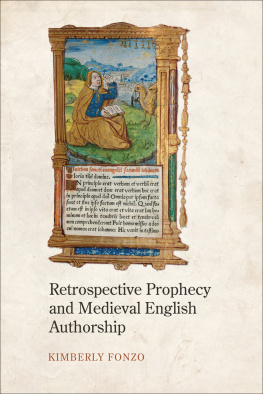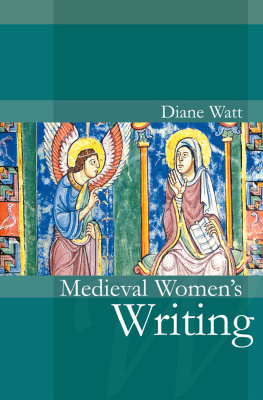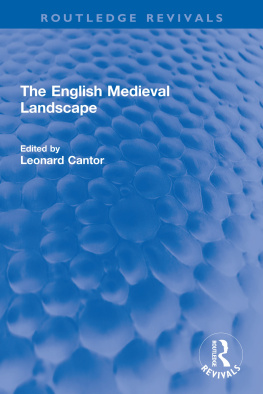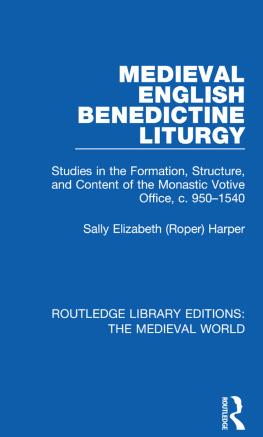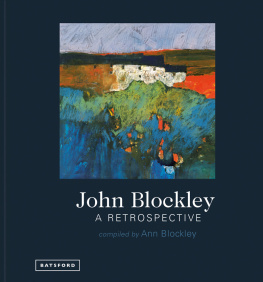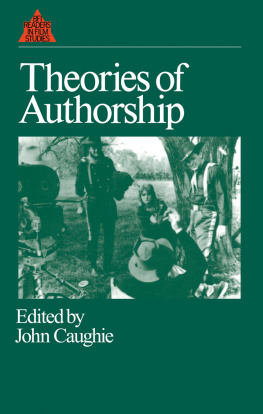Kimberly Fonzo - Retrospective Prophecy and Medieval English Authorship
Here you can read online Kimberly Fonzo - Retrospective Prophecy and Medieval English Authorship full text of the book (entire story) in english for free. Download pdf and epub, get meaning, cover and reviews about this ebook. year: 2022, publisher: University of Toronto Press, genre: Religion. Description of the work, (preface) as well as reviews are available. Best literature library LitArk.com created for fans of good reading and offers a wide selection of genres:
Romance novel
Science fiction
Adventure
Detective
Science
History
Home and family
Prose
Art
Politics
Computer
Non-fiction
Religion
Business
Children
Humor
Choose a favorite category and find really read worthwhile books. Enjoy immersion in the world of imagination, feel the emotions of the characters or learn something new for yourself, make an fascinating discovery.
- Book:Retrospective Prophecy and Medieval English Authorship
- Author:
- Publisher:University of Toronto Press
- Genre:
- Year:2022
- Rating:5 / 5
- Favourites:Add to favourites
- Your mark:
- 100
- 1
- 2
- 3
- 4
- 5
Retrospective Prophecy and Medieval English Authorship: summary, description and annotation
We offer to read an annotation, description, summary or preface (depends on what the author of the book "Retrospective Prophecy and Medieval English Authorship" wrote himself). If you haven't found the necessary information about the book — write in the comments, we will try to find it.
Retrospective Prophecy and Medieval English Authorship — read online for free the complete book (whole text) full work
Below is the text of the book, divided by pages. System saving the place of the last page read, allows you to conveniently read the book "Retrospective Prophecy and Medieval English Authorship" online for free, without having to search again every time where you left off. Put a bookmark, and you can go to the page where you finished reading at any time.
Font size:
Interval:
Bookmark:

KIMBERLY FONZO
UNIVERSITY OF TORONTO PRESS
Toronto Buffalo London
University of Toronto Press 2022
Toronto Buffalo London
utorontopress.com
Printed in the U.S.A.
ISBN 978-1-4875-6347-9 (cloth)ISBN 978-1-4875-6349-3 (EPUB)
ISBN 978-1-4875-6348-6 (PDF)
____________________________________________________________________________
Library and Archives Canada Cataloguing in Publication
Title: Retrospective prophecy and medieval English authorship / Kimberly Fonzo.
Names: Fonzo, Kimberly, author.
Description: Includes bibliographical references and index.
Identifiers: Canadiana (print) 20210278684 | Canadiana (ebook) 20210278706 | ISBN 9781487563479 (cloth) | ISBN 9781487563493 (EPUB) | ISBN 9781487563486 (PDF)
Subjects: LCSH: English literature Middle English, 11001500 History and criticism. | LCSH: Prophecy in literature. | LCSH: Chaucer, Geoffrey, 1400 Criticism and interpretation. | LCSH: Langland, William, 1330?1400 Criticism and interpretation. | LCSH: Gower, John, 1325?1408 Criticism and interpretation.
Classification: LCC PR275.P63 F66 2022 | DDC 820.9/358dc23
____________________________________________________________________________
We wish to acknowledge the land on which the University of Toronto Press operates. This land is the traditional territory of the Wendat, the Anishnaabeg, the Haudenosaunee, the Mtis, and the Mississaugas of the Credit First Nation.
University of Toronto Press acknowledges the financial support of the Government of Canada, the Canada Council for the Arts, and the Ontario Arts Council, an agency of the Government of Ontario, for its publishing activities.

Medieval authors adopted prophetic roles within their works because the prophet is an authoritative but intermediary figure. Although the prophetic subject position allowed authors to imply their own importance, it also allowed them to acknowledge external sources of inspiration. I suspect that most medieval authors would appreciate the sentiment of the contemporary, formal Acknowledgments section, even if its execution is considerably less artful than their own methods of acknowledging others. I myself appreciate the opportunity to thank the people who helped me write this book.
I would like to acknowledge Blair and Barbara Labatts generous financial support of the five-year Labatt Scholar fund, which allowed me to conduct manuscript research and attend conferences to develop the ideas in this book. I also appreciate the support of the Cecelia Jacobs Endowment in British Literature, which helped to fund this books publication. I am grateful to Robert W. Barrett, Lynn Staley, Karen Fresco, and Martin Camargo for their useful feedback on this project at its earliest stages. True to character, Charles D. Wright also selflessly offered his prompt and thorough input on my drafts of and moral support throughout the process of writing this book.
Eric Weiskott serendipitously organized a conference session about medieval prophecy at the International Congress on Medieval Studies at just the right moment for me to share and revise some of the ideas in this book, and he has since invited me to multiple conference sessions sponsored by the Piers Plowman Society. I am thankful for his collegial support and encouragement. Aaron T. Pratt gave me assistance with bibliographic details as I researched early print editions of medieval works, and Ann Hubert was kind enough to confer about my Latin translations on multiple occasions. My colleague, Mark Bayer aided me in writing my book proposal and navigating the publication process. It has been a privilege to work with acquisitions editor Suzanne Rancourt as well as the external readers of this book, who dedicated their time and expertise to helping me improve it.
I deeply appreciate the support of my parents, Raymond and Joyce, who have always encouraged my love of history and literature. My sister, Colleen, is one of the best editors of early drafts that I have found. Finally, this book would not be possible without my husband, Stephen. He has done over a thousand things, large and small, to support me during its composition. If I have a source of sublime inspiration as I write, it is he.
The prescience of medieval English authors has long been a source of fascination for readers. In The Art of English Poesie, written in 1589, George Puttenham describes how William Langland bent himselfe wholly to taxe the disorders of that age, and specially the pride of the Romane Clergy, of whose fall he seemeth to be a very true Prophet. Ostensibly, Puttenham emphasizes Langlands foresight for two interrelated reasons. First, his claim bolsters Langlands reputation as a wise authority, worthy of study. Even as Puttenham characterizes Englands fourteenth-century past as an age of disorders, he emphasizes Langland as a bright luminary in a supposedly dark time. Second, Puttenham portrays his present as being not only superior to the past but also anticipated by great thinkers like Langland. This perpetuates a comforting historical view that the English nation is progressing and improving, led by its best artists and scholars.
Modern readers have focused on medieval authors supposed predictions of historical events with similar enthusiasm. In 1968, Russell Peck wrote of the dedications to Henry of Lancaster in the Prologue of John Gowers Confessio Amantis, That he sees hope for England residing in a man like Henry of Lancaster even as much as seven years before Henry would become king, is indeed clairvoyant. is advancing a comforting view of history by touting Gowers clairvoyance. The notion that Gower predicted Henry IVs rise to power does not do much to affirm the present day, but it does imply that destiny and justice have guided Englands past.
The aim to see the seeds of contemporary progress in past prophetic authors is still evident in literary criticism about Geoffrey Chaucer. The modern tendency to view Chaucer as an aberrant medieval secular humanist arguably has its roots in Chaucers early modern reputation as a proto-Protestant. This reputation was developed in apocryphal poems and prophecies that were attributed to Chaucer after the Reformation. Building on Chaucers established reputation as a man ahead of his time, a good deal of contemporary criticism discusses him as a proto-Marxist, proto-feminist, proto-environmentalist, or proto-humanitarian. Tracing the origins of ideas is the natural and admirable project of historicist scholars, but an exaggerated view of Chaucer as the herald of our modern age has significant drawbacks especially insofar as it obscures Chaucers inventive work within his own fourteenth-century milieu.
Langland, Gower, and Chaucer each creatively adopted prophetic language and subject positions to develop their authorial personae and speak to the problems of their own times. However, misinterpreted, proleptically added, or apocryphally attributed prognostications have influenced their reputations in deceptive ways for centuries. I call these retrospective prophecies predictions that readers have ascribed to authors ex post facto. Later editors and readers have influentially misconstrued William Langland, John Gower, and Geoffrey Chaucer as prophets of the English Reformation, the deposition of Richard II, and modern rational scepticism, respectively. Even in cases where critics have recognized aspects of these authors prophetic reputations to be fabrications or exaggerations of past scholarship, vestigial features of popular retrospective prophecies remain influential in subtle ways. The enduring remnants of retrospective prophecy are especially problematic insofar as they distract from the innovative ways that medieval authors actually used prophetic symbols and language. This book therefore endeavors to tell two stories, that of the retrospective prophecies that have dominated Ricardian authors reputations and that of the authors meaningful engagement with prophetic discourses and identities. Why did medieval authors seek to invoke the persona of the prophet, and what were the dangers in evoking it
Font size:
Interval:
Bookmark:
Similar books «Retrospective Prophecy and Medieval English Authorship»
Look at similar books to Retrospective Prophecy and Medieval English Authorship. We have selected literature similar in name and meaning in the hope of providing readers with more options to find new, interesting, not yet read works.
Discussion, reviews of the book Retrospective Prophecy and Medieval English Authorship and just readers' own opinions. Leave your comments, write what you think about the work, its meaning or the main characters. Specify what exactly you liked and what you didn't like, and why you think so.

